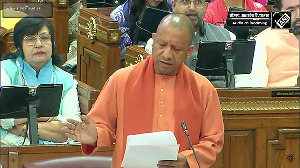Four days after closing the 2008 Beijing Games in triumph, China lit the 2008 Paralympic torch amid pomp and ceremony at Beijing's ancient Temple of Heaven, marking the start of a domestic relay for the September 6 Games.
Hazey weather, making an unwelcome return after the Olympics ended on Sunday, cleared enough to allow the sun to light a wick placed in a concave mirror at the front of the circular Prayer Hall for Good Harvests, an annual place of worship for Chinese emperors.
The flame was then passed to Beijing Olympic chief Liu Qi by wheelchair-bound Jin Jing, a 27-year-old amputee and Paralympic fencer whose fierce defence of the Olympic torch during the Paris leg of the troubled global relay made her a national hero.
"The two Games equal splendour," said Liu, president of the Beijing Organising Committee for the Olympic Games, in a speech.
Liu passed the torch to Chinese Premier Wen Jiabao, who lit a cauldron and announced the commencement of the relay, sparking a bombastic display of traditional Chinese dance by disabled artists.
The cauldron's lighting was the crowning of a dramatic ceremony in which dozens of white-robed performers emerged from behind the gabled prayer hall flourishing national flags.
"This flame will symbolise over the next 10 days the unique sporting spirit portrayed by Paralympic athletes. This spirit overcomes many obstacles in the pursuit of sporting excellence," said International Paralympic Committee president Philip Craven.
The flame will travel on Friday to ancient capital Xian, now the modern capital of northwestern Shaanxi province, before heading to southern industrial hub Shenzhen in coastal Guangzhou province on Saturday.
The Paralympic Games will be held in Beijing from September 6-17.
The international leg of the Olympics relay was disrupted by pro-free Tibet protesters angry at China's crackdown on rioting in its western region of Tibet in March.
The attack on the torch relay in Paris sparked anti-French protests by Chinese, but the August 8-24 Games were widely held as a huge success and were trouble free, aside from a few tiny protests by pro-free Tibet groups.








 © 2025
© 2025